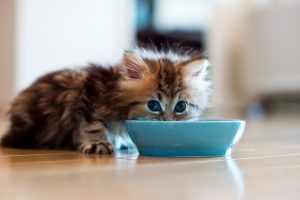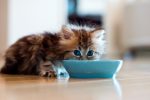Cheese for mice, bones for dog, and milk for cats! Yes, we do like to associate a bowl of milk for cat, right? We see it in the movie and childhood cartoon. Cats also look as they enjoying it! So milk is good for cats!
But… is it?
There are some researches about the impact of milk on cat’s digestion. Turns out, just like us, cats normally have lactose intolerance! Here is some information for you to know before feeding your cats with milk.

A Bowl Of Milk For A Cat Is Common, But There’s Something You Need To Know
Okay, we start with the bad news that cats can be lactose intolerance, which means their digestive system don’t really get along with milk sugar or lactose in the dairy product. Lactose passes into the large intestine without being digested, then remains there and ferments in their digestive system which causing stomach upset. You can notice they are having stomach upset from their sudden meowings.
But they are mammals! Baby mammals drink milk from their mother, how can they have lactose intolerance?
Kittens can properly digest lactose because they have enough lactase enzyme during their early years of life. This enzyme helps them to break down and trasnform the lactose into simple sugars. They can drink from their mother’s milk. But milk doesn’t give them the nutrients and proteins that growing cats need. So after eight to ten weeks, solid food takes the place, and they no longer need the ability to digest milk any more. Mostly after being weaned from their mother, they gradually start to decrease their lactase enzyme production which then leads into intolerance as they grow older.
Side story; what happens if the kitten has been orphaned?
Is it okay for us to give it cow’s milk, for example? The answer is no. The composition of cow’s milk is different from the mother’s milk which means the kitten wouldn’t get the nutrients and proteins that it needs. The type of carbohydrate in cow’s milk also bad for kittens since they don’t digest carbohydrates properly (the most healthy are proteins and fats, instead). Cow’s milk may lead to gastrointestinal problem like bloating until diarrhea so try to avoid cow’s milk for them. The best option is to consult to the veterinarian to get advice about the diet option based on the kitten’s condition.
They like it, but don’t need it
What we should understand is that milk is not their natural part of diet. Cats, surprisingly, do not need milk after all. Also, some type of milk may add unhealthy amounts of fat to your cat to promote weight gain.
But they do like it! Cats like high content in dairy products. Even some researchers found that drinking milk can help the cats to relax as much as they groom. But giving milk for their pleasure is still not an excuse! Milk is still having some bad effects for your cats.
The symptoms of lactose intolerance and allergic to lactose
Drinking milk can develop some gastrointestinal distress for your lactose intolerance cats. You will know your cats are lactose intolerance within 8 to 12 hours by the symptoms that are shown by your cats. The symptoms are nausea and vomiting, diarrhea, gas, until swelling of the abdominal area. Another research also shows that feeding milk cats regularly in long term can result in negative impacts on reproduction, longevity, bone structure, and growth.
Beside lactose intolerance, your cats, unfortunately, can also have a chance to allergic to lactose. In this case, your cats’ immune system develops hypersensitivity and emits and allergic reaction whenever they consume milk or dairy products. The symptoms are hives, coughing until difficulty breathing, vomiting, diarrhea, and decrease in blood pressure.
What if your cats are not lactose intolerance?
Just like us, not every cat have a problem with consuming milk. Some cats don’t have any issues with their digestive system after consuming small amount of cow’s milk. But be careful, you should not giving your cats chole cow’s milk due to a high level of fat and sugar content. Or if you want to have a safer option, you can pick lactose-free cow’s milk for your cats.
Plant-based milk or nut-based milk like almond milk, soy milk, or coconut milk, pasteurized milk, and high carb milk like sweetened condensed milk and evaporated milk are bad for your cats so try to avoid them if possible. In general, you can give your cats a small amount of raw cows or even goats’ milk.
Water is better!
Do you know what is better than milk? Water! Your cats need water the most, just like other animals. Water is important for optimizing cats’ organ function. But cats don’t always drink enough water. The best way to make sure your cats fulfill their need for water and stay hydrated is by adding wet food or canned for their diet intake. You can also track your cats to drink more water in fun ways like using a cat fountain rather than from a bowl. Moving water may encourage your cats to lick and drink more.
That is all you need to know about milk for the cat. Giving a bowl of milk for your cats might look good on movie and cartoon, but in real life, it is just like giving your cats a junk food since they don’t really need the nutrients that are contained in milk or dairy product, and most of them cannot handle the lactose in it. If somehow your cats drink milk and show some symptoms of lactose intolerance or allergic to milk, don’t hesitate to go and consult to your vet for the best treatment and advice for other healthier diet option. You can also try to swap your cats’ treat with tuna or other animal-derived protein which are they can handle better than milk.

